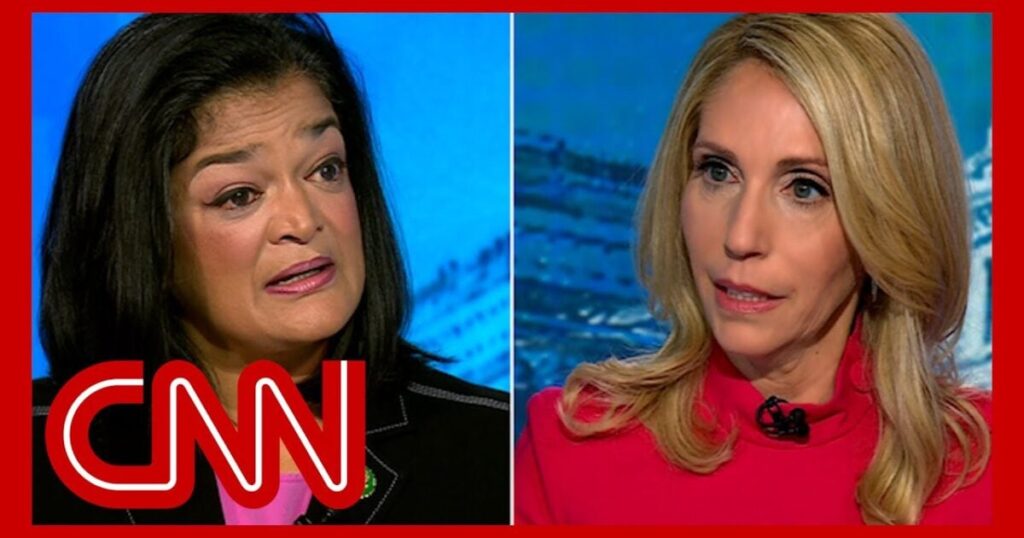Among the turbulent occurrences that define our world, few are as chilling as the use of sexual violence as a war tactic by Hamas. Despite the undeniable horror encapsulated in these actions, Rep. Pramila Jayapal (D-WA) recently opted to circumnavigate the issue, refusing to outrightly condemn these atrocities. Her recent appearance on CNN’s State of the Union with Dana Bash has raised pertinent questions regarding her stance on this sensitive issue.
Reports of sexual atrocities committed by Hamas, an internationally-recognized terrorist organization, have only been growing in both intensity and frequency. Notable accounts of heartbreaking survival from victims who have been subjected to sexual violence have come to light. Victims who have experienced these horrific incidents firsthand narrate deeply disturbing tales, such as the witnessing of another woman being raped before being brutally executed.
Despite such irrefutable evidence, Rep. Jayapal’s interview with Bash reflected an unwillingness to fully acknowledge and condemn Hamas’s use of sexual aggression. Instead of unequivocally addressing the issue at hand, Jayapal diverted the dialogue towards the conflict between Israel and Palestine, ultimately failing to extend the expected empathy and conviction against the ghastliness that befell these innocent Israeli women.
Jayapal’s continued reluctance to address the crimes committed by Hamas since their heinous rampage on October 7 remains perplexing, especially in light of her long-standing commitment to women’s rights. The shockingly vague response to the use of rape as a tool of war is only accentuated by her frequently displayed anti-Israel posture, as reported by The Gateway Pundit.
The problems are further exacerbated by her comparing the Israeli response to the massacre of innocent civilians and rape of young women on October 7 to the “siege of Ukraine” by Russia. Such comparative rhetoric presents an unsettling disregard for the unique ramifications experienced by distinct geopolitical conflicts.
The aspiration for a balanced perspective should be crucial in any discourse involving humanitarian crises. However, Jayapal continues to undermine the urgency surrounding the explicit condemnation of sexual violence by making parallel references to the Israeli-Palestinian conflict, without providing distinct separate responses to these multi-faceted concerns.
As we attempt to piece together a coherent image of the global political landscape, the importance of clarifying standpoints on such delicate issues cannot be understated. This particularly relates to people of influence, such as Rep. Jayapal, who are looked up to for direction, solidarity and advocacy against such acts of deplorable violence. Their voices form the foundational basis for how the international community responds, and deflecting or downplaying the atrocities of sexual war crimes only sends a discordant note that shakes the world’s faith in their leadership.
In examining this situation, we must remain steadfast in our commitment to seeing matters for what they are. Refusing to condemn the horrors inflicted by Hamas’s sexual warfare on women, especially as they are indisputably documented, signifies a moral fail at an exceptionally profound level. The time to correct course remains at hand, and it is our ardent hope that Rep. Jayapal might yet lend her voice to the unambiguous condemnation of these crimes.
As we reach the edges of this bitter narrative, the echoes of Dana Bash’s words ring true: “You don’t see Israeli soldiers raping Palestinian women.” The international community watches keenly as we wade through these tumultuous waters. At this juncture, clarity, fairness, and unflinching acknowledgment of veritable war crimes are paramount. An outright condemnation of Hamas’s sexual violence is not just expected—it is demanded by humanity itself. In the grand theatre of global politics, leaders must recognize our shared moral compass, emerging victorious from the shadows of divisive politics and stepping into the clear light of unified and unequivocal justice.



